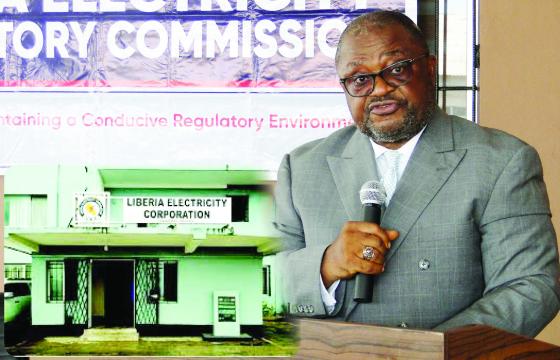Liberia: ‘Poor LEC Service Due to Gov’t Debt’

LERC Chair Dr. Lawrence Sekajipo has described the agencies concerned as neglectful and chronic debtors.
— LERC Chairman Sekajibo
The Liberia Electricity Corporation has been given the authority to disconnect several government agencies that are ‘delinquent and persistent debtors’ — denying the national grid operator more than US$ 1 million in revenue and creating problems for effective service.
The agencies, which are 11 in all, include the Monrovia City Corporation, headed by Mayor Jefferson Koijee, a stalwart in the ruling Coalition for Democratic Change government; the Environmental Protection Agency; Liberia Institute of Statistics and Geo-Information Services; and the University of Liberia.
Combined, these agencies, along with the Independent National Human Rights Commission, National Housing Authority, National Transit Authority, National Aids Control Program, National Disaster Management Agency, National Drug Service, and National Oil Company of Liberia, owe the LEC US$1,321,196 for the supply of electricity services.
The debt, according to the Board of Commissioners of the Liberia Electricity Regulatory Commission (LERC), which is headed by Dr. Lawrence Sekajipo, has described the agencies concerned as neglectful and chronic debtors.
“The LERC expressed dissatisfaction that several public agencies have accrued an energy debt of US$1,321,196 for the supply of electricity services by LEC,” a release from the energy regulator said. “The Commission calls on the management of the LEC to immediately embark on a massive disconnection exercise of “these delinquents and persistent debtors.”
The LERC order comes after President George Weah a month ago instructed the LEC to disconnect anyone who is not paying their bills or who has an illegal connection, regardless of their status.
The President gave the order during an energy sectoral meeting he hosted with diplomatic partners as well as other officials of the government, to find an amicable solution to the electricity nightmare in the country.
“We also receive a commitment from the President to disconnect anyone who is not paying their bills or who has an illegal connection, regardless of whether you are a government official or a government entity, and electricity is something that is not free,” said Monie Captan, the Chairman of the Board of Directors at LEC.
The LERC, in defense of its order, argued in the release that the move is not illegal but wants to be carried out in accordance with Regulations 28 of the Customer Service and Quality of Supply Regulations which provides that “A service provider may disconnect service to a customer when the customer: fails to pay a bill for the service for more than 14 days from the date of the delivery of the demand for payment by the service provider.”
The LREC added that LEC informed them as a regulator that several autonomous agencies and commissions of government have failed to settle their energy debts and were now in a “delinquent status” with the corporation — leaving it short of funds needed for effective service.
“The commission supports LEC’s decision that persistently defaulting customers and illegal electricity consumers are immediately disconnected by the Corporation,” the release noted.
“There remains a compelling need for consumers of electricity to continue to pay their bills to ensure that the public electricity utility, the Liberia Electricity Corporation, generates enough revenue to provide a reliable and stable service to the people of Liberia.
Meanwhile, apart from the issue of delinquent payment, the LEC suffers from chronic power theft, which has been criminalized and can lead to more than two years of jail term and a fine.
Power theft is being practiced by both the rich and the poor — creating a situation where 60% of the electricity generated by the state-owned power utility becomes stolen through illegal connections. These illegal connections, which are something carried out by LEC staff, have for four years also robbed the corporation of much-needed cash to extend the power supply.
So far, less than 20% of Liberians have access to electricity; however, the government has set itself the target of rolling out electricity to 70% of Monrovia's population of more than one million by 2030.
But such ambition is highly unlikely when LEC, according to its manager, is losing 60 percent of its revenue to power theft, amounting to more than US$4 million monthly.
